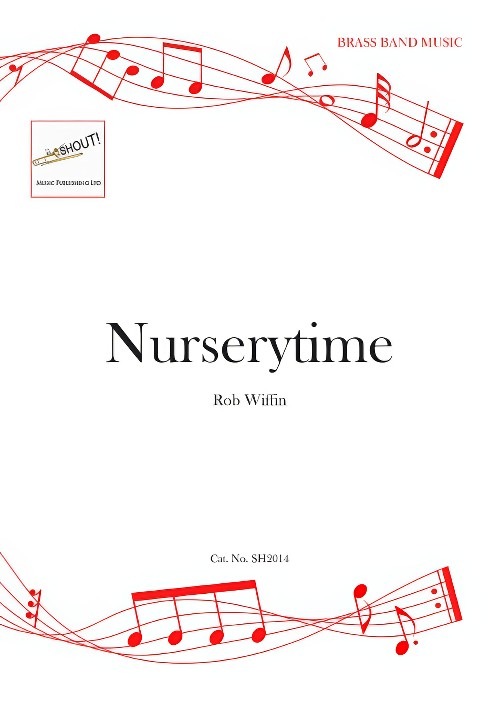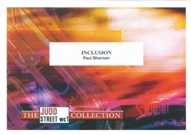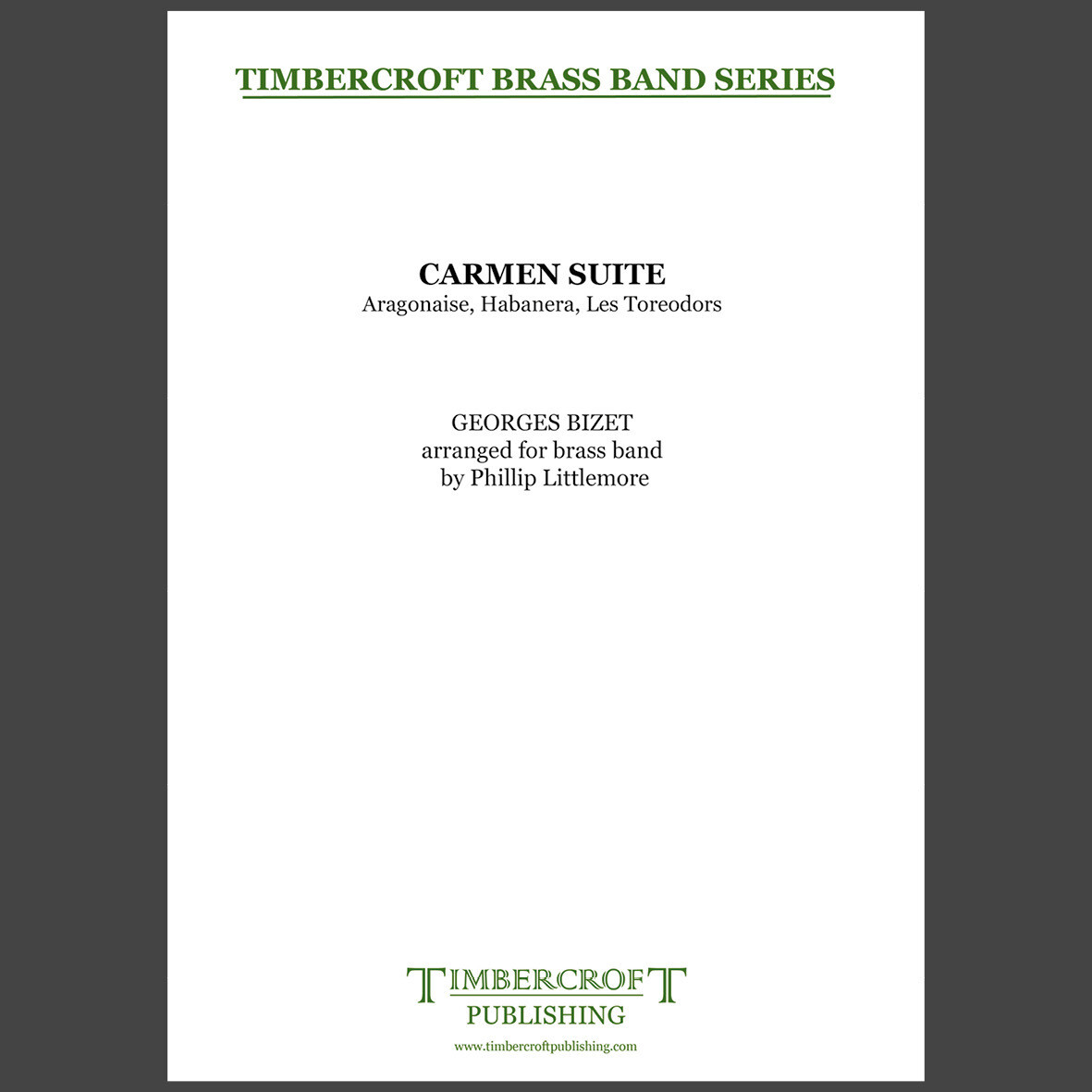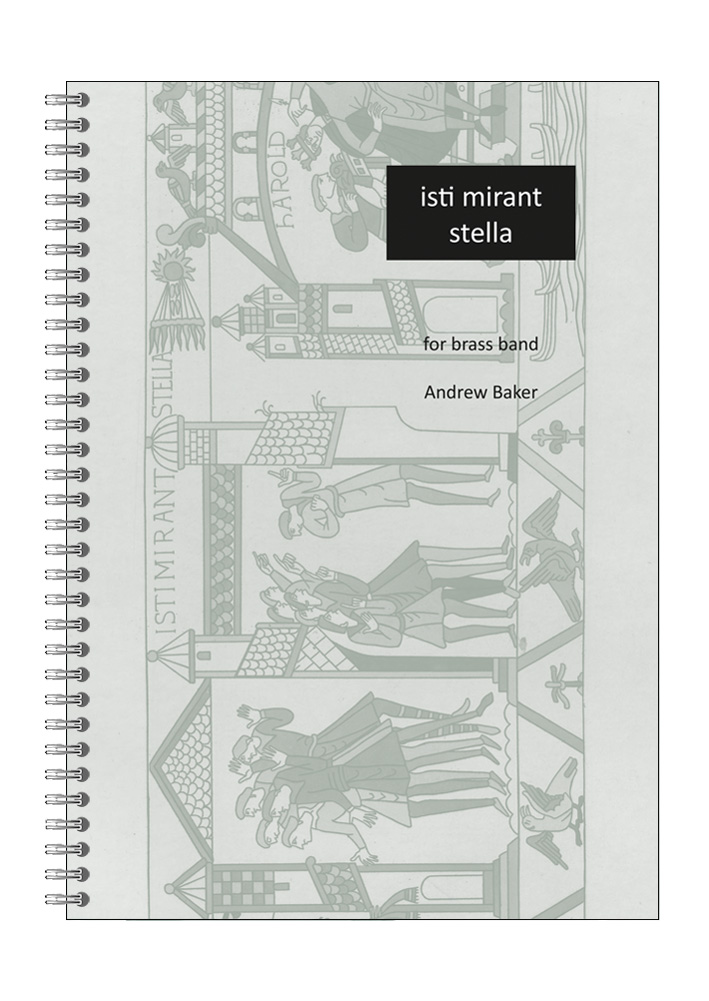Results
-
 £32.95
£32.95Nurserytime (Brass Band - Score and Parts) - Wiffin, Rob
This selection of well-known nursery rhymes and children's songs was made for the 2006 Party at the Palace. It includes Here we go round the Mulberry Bush, Incy Wincy Spider, Half a Pound of Tuppenny Rice, Three Blind Mice, Singing Polly Wolly Doodle, Old MacDonald had a Farm, One Man Went to Mow a Meadow, and Oh Dear What Can the Matter Be amongst others (Ring-a-ring a-roses, Hickory-dickory dock, Row, row, row your boat, Skip to my Lou)Duration: 5.00
Estimated dispatch 7-14 working days
-
£59.95
Inclusion (Brass Band - Score and Parts) - Sharman, Paul
Inclusion was commissioned by Bolsover District Council for the Bolsover Brass Band Summer School in July 2013, with funding from Arts Council England. The piece takes its theme from the fact that everybody, no matter what their background, should feel included in our churches and in society in general.
Estimated dispatch 7-14 working days
-
£29.95
Inclusion (Brass Band - Score only) - Sharman, Paul
Inclusion was commissioned by Bolsover District Council for the Bolsover Brass Band Summer School in July 2013, with funding from Arts Council England. The piece takes its theme from the fact that everybody, no matter what their background, should feel included in our churches and in society in general.
Estimated dispatch 7-14 working days
-
 £59.95
£59.95INCLUSION (Brass Band) - Sharman, Paul
2017 Butlins Mineworkers Contest Test Piece Second Section. Inclusion was commissioned by Bolsover District Council for the Bolsover Brass Band Summer School in July 2013, with funding from Arts Council England. The piece takes its theme from the fact that everybody, no matter what their background, should feel included in our churches and in society in general.
Estimated dispatch 7-14 working days
-
 £40.00
£40.00Carmen Suite - Georges Bizet arr. Phillip Littlemore
Incredible as it seems today, Bizet's opera Carmen was met with a lukewarm reception at its premiere at the Paris Opera-Comique in 1875; critics condemned its subject matter as lurid and its music overly Wagnerian, and it ran for a mere 37 performances. Bizet died with a few days of it opening at the tragically early age of just thirty-six. Now hailed as the composer's supreme achievement, this colourful, passionate work continues to delight listeners around the world with its emotional, atmospheric music and the originality of its conception. Two orchestral suites were created in the latter part of the 19th Century each containing six pieces.This brass band arrangement brings together three of these pieces, the Aragonaise , the Habanera and Les Toreadors .Duration: c.7'00"Difficulty: 3rd Section and above
Estimated dispatch 5-7 working days
-
 £79.61
£79.61Blaenwern Diversions (Brass Band) Karl Whelan
Commissioned by Micah Dominic Parsons, Blaenwern Diversions is based on the well loved hymn, Love Divine. The composer writes: 'Originally intended to be a set of variations, I found myself wandering around the notes of the hymn tune at the piano and found that the variations almost took on a life of their own resulting in what we have here - diversions. There are 8 diversions in total; the introductory diversion; diversions 1 - 6; and the finale which are divided into three linked movements. Blaenwern Diversions represents my entry into the world of contest works, so even though the piece aims to test the band, it is important that the band enjoy the music within no matter how treacherous!' To view a follow-the-score video please visit www.youtube.com/watch?v=6X5gTMTHkfg PDF download includes score and parts. Sheet music available from: UK - www.brassband.co.uk USA - www.solidbrassmusic.com Difficulty Level: Championship Instrumentation: Soprano Cornet Eb Solo Cornet Bb Repiano Cornet Bb 2nd Cornet Bb 3rd Cornet Bb Flugel Horn Bb Solo Horn Eb 1st Horn Eb 2nd Horn Eb 1st Baritone Bb 2nd Baritone Bb 1st Trombone Bb 2nd Trombone Bb Bass Trombone Euphonium Bb Bass Eb Bass Bb Timpani Percussion 1-3
In stock: Estimated dispatch 1-3 days
-
 £34.95
£34.95Aristotle's Air - Christopher Bond
The Ancient Greeks believed that there were four elements that everything was made up of: earth, water, air and fire. This theory was suggested around 450 BC, and was later supported and added to by Aristotle. The idea that these four elements - earth, water, air and fire - made up all matter was the cornerstone of philosophy, science, and medicine for two thousand years. Air was considered a 'pure' element, but in fact the air that's all around us is made up of a variety of gasses. Of course, in music, air has a different meaning; a beautiful song-like melody or tune and Aristotle's Air is just that. The work was commissioned by and written for The Cory Band as part of their winning 2015 Brass in Concert programme 'The Four Elements of the Universe', being premiered at the contest at The Sage, Gateshead, on 15th November 2015. The work was awarded the Cyril Beere Memorial Trophy for the Best New Composition or Arrangement.
Estimated dispatch 5-10 working days
-
 £35.00
£35.0030 Day Technical Challenge
The 30 Day Technical Challenge This 30 day program is a step by step guide to improve your technique. Each practice session is laid out day by day, exercise by exercise for maximum technical improvement. During the next 30 days you will improve: Breathing Lip Flexibility Single Tonguing Finger Dexterity The Bootcamp will only require a small amount of extra time on top of your normal practice regiment. All you will need is a metronome and your instrument. It does not matter if you are grade 1 or grade 8+ this program will improve your technique. Practice Until Failure If you do not practice until you fail, you are not pushing your technique to its limit. Whether it be squeezing the last drop of air out of your lungs in a breathing exercise, or completing a tonguing exercise until your tongue is completely exhausted, the harder you push yourself the more progress you will see during the 30 days. Taking The Tests Take all 4 tests on day 1. Try to push yourself and reach the highest level possible. There over 20 levels that you can achieve on each test. Start each test from the beginning, playing each exercise at the stated tempo markings before moving on. Exercise 1 corresponds to levels 1 - 5, one level for each tempo written. Levels 6 - 10 are from Exercise 2, 11 - 15 Exercise 3 and 16 - 20 Exercise 4. If you reach level 20, continue changing the tempo on Exercise 4 until you reach failure. Add 1 level for every extra tempo marking completed. Make note of the level you achieve for each test, this will be needed for your comparison at the end of the 30 days. Once you have taken the tests simply follow the calendar and complete the set exercises each day. The weekend practice sessions ask you to repeat the exercises from earlier in the week. This gives you a second chance to push your technique further on each exercise. The Final Test Complete the 4 tests again on day 30 and compare your results. Good luck and enjoy the next 30 days!
Estimated dispatch 5-7 working days
-
 £45.00
£45.00isti mirant stella
Descriptionisti mirant stellais based on an extract from the text of the Bayeux Tapestry, which was commissioned by Odo, Bishop of Bayeux, to commemorate the Norman conquest of England in the 11th century. This text relates to the appearance of Halley's Comet in the spring of 1066. King Edward the Confessor died without an heir early on 5 January 1066 and despite his apparent promise of the throne to William, Duke of Normandy, the Anglo-Saxon Witenagemot appointed Harold Godwinson of Wessex as his successor. Just after Harold's hastily arranged coronation the comet appeared, reaching its perihelion on 20 March 1066. In the Middle Ages comets were regarded as evil omens; the tapestry depicts men gazing at the "star" in wonder and Harold himself apparently lost in nightmarish visions of invasion, with ghostly ships in the margins of the tapestry.The music attempts to reflect the mood of this brief but crucial period of English history - the unsettled matter of the royal succession linked in the superstitious medieval imagination to the haunting, spectral apparition of the comet. Medieval composition techniques are employed in places, including the use of a 'tenor', hocketing and a brief isoryhthmic motet. The music attempts to avoid tonal centres and particularly any form of diatonic 'resolution', instead exploring the issue of unresolved dissonance as a musical device in its own right.Performance Notes:All cornets, flugel and solo horn will require bottles filled with water to varying levels to 'tune' them to the correct pitch for the closing section of the piece. Pitches for the bottles are notated in the same transposition as the player's main instrument, so for example a notated D in the bottle part for flugel would sound as a C.All cornets except soprano require harmon mutes; where these are marked 'TR' these should have the tube removed. 'TI' denotes the tube should be left all the way in. Soprano and solo cornet III require metal straight mutes; flugel, all tenor horns, 2nd baritone and both euphoniums require fibre straight mutes. Soprano, all solo cornets and all trombones require cup mutes.The percussion section will require vibraphone (with a suitable bow, preferably a 'cello bow), glockenspiel, tubular bells (low and high E only), concert bass drum, tam-tam and snare drum - the bass drum and tam-tam will require brushes in addition to the normal beaters. In addition 1st horn and 1st baritone are required to play triangles, which should ideally be different pitches if possible.Approximate duration 7'48"NOTE: This set comes with a B4 score. To view a PDF preview click here.
Estimated dispatch 7-14 working days
-
£70.00
Origins - Peter Meechan
Origins is in three movements, with each movement having a different subject matter, all linked by the idea of origins: the first movement refers to musical origins; the second to the origins of life; and the final movement to the space exploration - the research of all origins. The first movement is based on a short motif, heard in the first three notes the soloist plays. These three notes cover the interval of a minor third (an interval that often plays a crucial role in my music) on which the whole concerto is built. The soloist and accompaniment interplay freely throughout the opening section, before an ostinato accompaniment appears - over which the soloist sounds a long legato melody. A short cadenza follows and a return to the opening material leads the movement to an end. The second movement, titled Harryas Song, is - as tradition dictates - a slow movement. Happy and reflective in nature, the main melody was written on the evening that my closest friend, Mark Bousie (a fine euphoniumist himself), and his wife Jayne, had their first child - Harry Bousie. It seemed only fitting that this song should be written for Harry in celebration. The final movement brings me back to a lifelong fascination with space, and in this particular movement, the Space Shuttle Discovery. Having completed 39 missions (including flying the Hubble telescope in to orbit), and spent a total of 365 days in space, SS Discovery made its final voyage in 2011 and was taken to the Smithsonian in Washington D.C. in April 2012. This final movement, titled Discovery, pays tribute to the great shuttle whose missions inspired millions across the generations. Origins was commissioned by Marco Schneider, Adrian Schneider and the Dunshan Symphonic Wind Orchestra, Beijing, China.
Estimated dispatch 12-14 days
